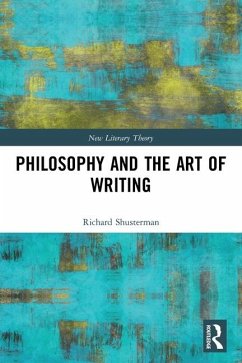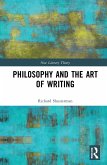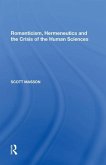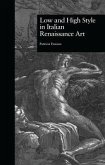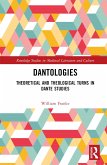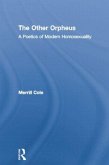Philosophy and literature enjoy a close, complex relationship. Elucidating the connections between these two fields, this book examines the ways philosophy deploys literary means to advance its practice, particularly as a way of life that extends beyond literary forms and words into physical deeds, nonlinguistic expression, and subjective moods and feelings.
Exploring thinkers from Socrates and Confucius to Foucault and Simone de Beauvoir, Richard Shusterman probes the question of what roles literature could play in a vision of philosophy as something essentially lived rather than merely written. To develop this vision of philosophy that incorporates literature but seeks to go beyond the verbal to realize the embodied fullness of life and capture its inexpressible dimensions, Shusterman gives particular attention to authors who straddle the literature/philosophical divide: from Augustine and Montaigne through Wordsworth and Kierkegaard to T.S. Eliot, Georges Bataille, Maurice Blanchot, and Bertrand Russell. The book concludes with a chapter on the Chinese art of writing with its mixture of poetry, calligraphy, and painting.
Philosophy and the Art of Writing should interest students and researchers in literary theory and philosophy. It also opens the practice of philosophy to people who are not professionals in the writing of philosophy or literary theory.
Exploring thinkers from Socrates and Confucius to Foucault and Simone de Beauvoir, Richard Shusterman probes the question of what roles literature could play in a vision of philosophy as something essentially lived rather than merely written. To develop this vision of philosophy that incorporates literature but seeks to go beyond the verbal to realize the embodied fullness of life and capture its inexpressible dimensions, Shusterman gives particular attention to authors who straddle the literature/philosophical divide: from Augustine and Montaigne through Wordsworth and Kierkegaard to T.S. Eliot, Georges Bataille, Maurice Blanchot, and Bertrand Russell. The book concludes with a chapter on the Chinese art of writing with its mixture of poetry, calligraphy, and painting.
Philosophy and the Art of Writing should interest students and researchers in literary theory and philosophy. It also opens the practice of philosophy to people who are not professionals in the writing of philosophy or literary theory.
'Philosophy and the Art of Writing revitalizes [the] ancient tradition of philosophy as an embodied way of living, and examines the various ways the process and product of the art of writing can contribute to the philosophical life dedicated to self-examination and self-improvement, while also pointing out the ambiguities of such an enterprise ...[This] is a thought-provoking, dialogue-engendering essay that is meant to be accessible for a wider audience. . . . [The shorter format] condenses Shusterman's argument and helps the reader not to lose sight of the genuine philosophical problems, register the differences and common traces during the three sets of case studies, or establish connections among the relevant philosophical, literary, and cultural traditions. Shusterman's argument inhabits and moves within these various traditions with an impressive ease. And it is exactly here, in the elegant philosophical syntheses and surprising cross-cultural connections, where the reader will find the hidden gems of the book.' - Botond Csuka, The Journal of Aesthetics and Art Criticism, 2022
'Early in Richard Shusterman's magnificent and exquisitely learned Philosophy and the Art of Writing (Shusterman 2022), we read a beautiful description of philosophy, a discipline that has inspired Western artists and thinkers for more than two millennia . . . Much is compressed into those three sentences, just as so much of importance for our time is condensed in the 132 pages of Philosophy and the Art of Writing. Its length belies its richness and philosophical density. Whatever else one might want to say about this groundbreaking book, it is, first and foremost, an exploration of art and spirituality. I have spent a lifetime brooding on, studying, and writing about this important subject. . . . I believe everyone concerned with the state of the liberal arts and PWL [philosophy as a way of life] has a stake in this book. And so, humbly, I hope this response in some small measure does justice to a work I've been waiting for and wanting to read my entire life.' - Charles Johnson, Metaphilosophy
'The book lays a masterful groundwork for future research on this subject'. - Eli Kramer, 'The philosophical way of life as sub-creation', Metaphilosophy
'A number of things struck me as important and original in reading Richard Shusterman's delightful recent book Philosophy and the Art of Writing.' - Randall Auxier, 'Philosophy as a thief?, Metaphilosophy
'This is a fascinating volume and is worth reading by anyone who is interested in the role of writing in philosophical life and who wants to expand their interpretive horizons' - Uku Tooming, Journal of Aesthetics and Phenomenology, 10:1, 2023
'Shusterman displays with some elegance the many parallels between the Western tradition of artful writing as part of philosophic self-examination, and the art of writing in the Confucian and Daoist projects of self-cultivation. Further, his claim that the ideographic nature of the Chinese language had the consequence that 'orality had no priority for thought' (p. 94) is helpfully suggestive.' - Martin Warner, The British Journal of Aesthetics, ayac075, April 2023
'One of the reasons why Richard Shusterman's [...] book is important is because it manages to connect, with refined accuracy, what various authors have not only distinguished, but also divided and opposed. Indeed, Shusterman moves, with fluency, between different philosophical and literary traditions. Not only that, the relevance of Philosophy and the Art of Writing also lies above all in the originality with which the relationship between philosophy and literature is read, interpreted, and argued, starting from a specific, and theoretically fertile, understanding of these two fields.' - Valentina Antoniol, Meta: Research In Hermeneutics, Phenomenology, And Practical Philosophy, June 2024
'Philosophy and the Art of Writing (2022) offers an insightful view about the relationship between philosophy and literature, intertwining those forms of intellectual practice and using them as mirrors to reflect each other. In a very original and interesting way, he writes a final chapter dealing with a field that has been generally neglected by Western philosophers and aesthetics scholars: the art of writing in Chinese thought.' - Marcello Ghilardi, Meta: Research In Hermeneutics, Phenomenology, And Practical Philosophy, June 2024
'Early in Richard Shusterman's magnificent and exquisitely learned Philosophy and the Art of Writing (Shusterman 2022), we read a beautiful description of philosophy, a discipline that has inspired Western artists and thinkers for more than two millennia . . . Much is compressed into those three sentences, just as so much of importance for our time is condensed in the 132 pages of Philosophy and the Art of Writing. Its length belies its richness and philosophical density. Whatever else one might want to say about this groundbreaking book, it is, first and foremost, an exploration of art and spirituality. I have spent a lifetime brooding on, studying, and writing about this important subject. . . . I believe everyone concerned with the state of the liberal arts and PWL [philosophy as a way of life] has a stake in this book. And so, humbly, I hope this response in some small measure does justice to a work I've been waiting for and wanting to read my entire life.' - Charles Johnson, Metaphilosophy
'The book lays a masterful groundwork for future research on this subject'. - Eli Kramer, 'The philosophical way of life as sub-creation', Metaphilosophy
'A number of things struck me as important and original in reading Richard Shusterman's delightful recent book Philosophy and the Art of Writing.' - Randall Auxier, 'Philosophy as a thief?, Metaphilosophy
'This is a fascinating volume and is worth reading by anyone who is interested in the role of writing in philosophical life and who wants to expand their interpretive horizons' - Uku Tooming, Journal of Aesthetics and Phenomenology, 10:1, 2023
'Shusterman displays with some elegance the many parallels between the Western tradition of artful writing as part of philosophic self-examination, and the art of writing in the Confucian and Daoist projects of self-cultivation. Further, his claim that the ideographic nature of the Chinese language had the consequence that 'orality had no priority for thought' (p. 94) is helpfully suggestive.' - Martin Warner, The British Journal of Aesthetics, ayac075, April 2023
'One of the reasons why Richard Shusterman's [...] book is important is because it manages to connect, with refined accuracy, what various authors have not only distinguished, but also divided and opposed. Indeed, Shusterman moves, with fluency, between different philosophical and literary traditions. Not only that, the relevance of Philosophy and the Art of Writing also lies above all in the originality with which the relationship between philosophy and literature is read, interpreted, and argued, starting from a specific, and theoretically fertile, understanding of these two fields.' - Valentina Antoniol, Meta: Research In Hermeneutics, Phenomenology, And Practical Philosophy, June 2024
'Philosophy and the Art of Writing (2022) offers an insightful view about the relationship between philosophy and literature, intertwining those forms of intellectual practice and using them as mirrors to reflect each other. In a very original and interesting way, he writes a final chapter dealing with a field that has been generally neglected by Western philosophers and aesthetics scholars: the art of writing in Chinese thought.' - Marcello Ghilardi, Meta: Research In Hermeneutics, Phenomenology, And Practical Philosophy, June 2024

